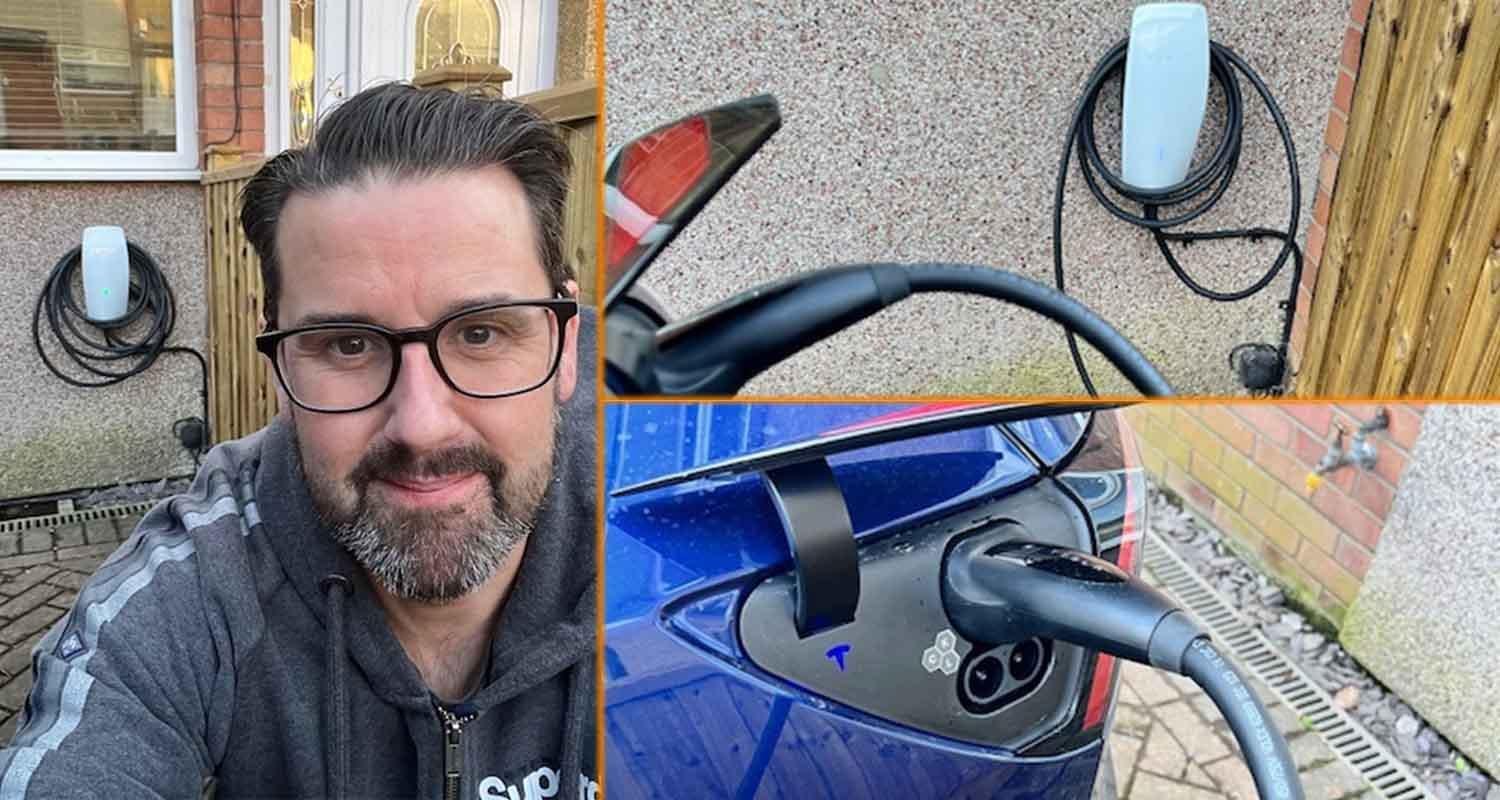Why the future of transport is electric
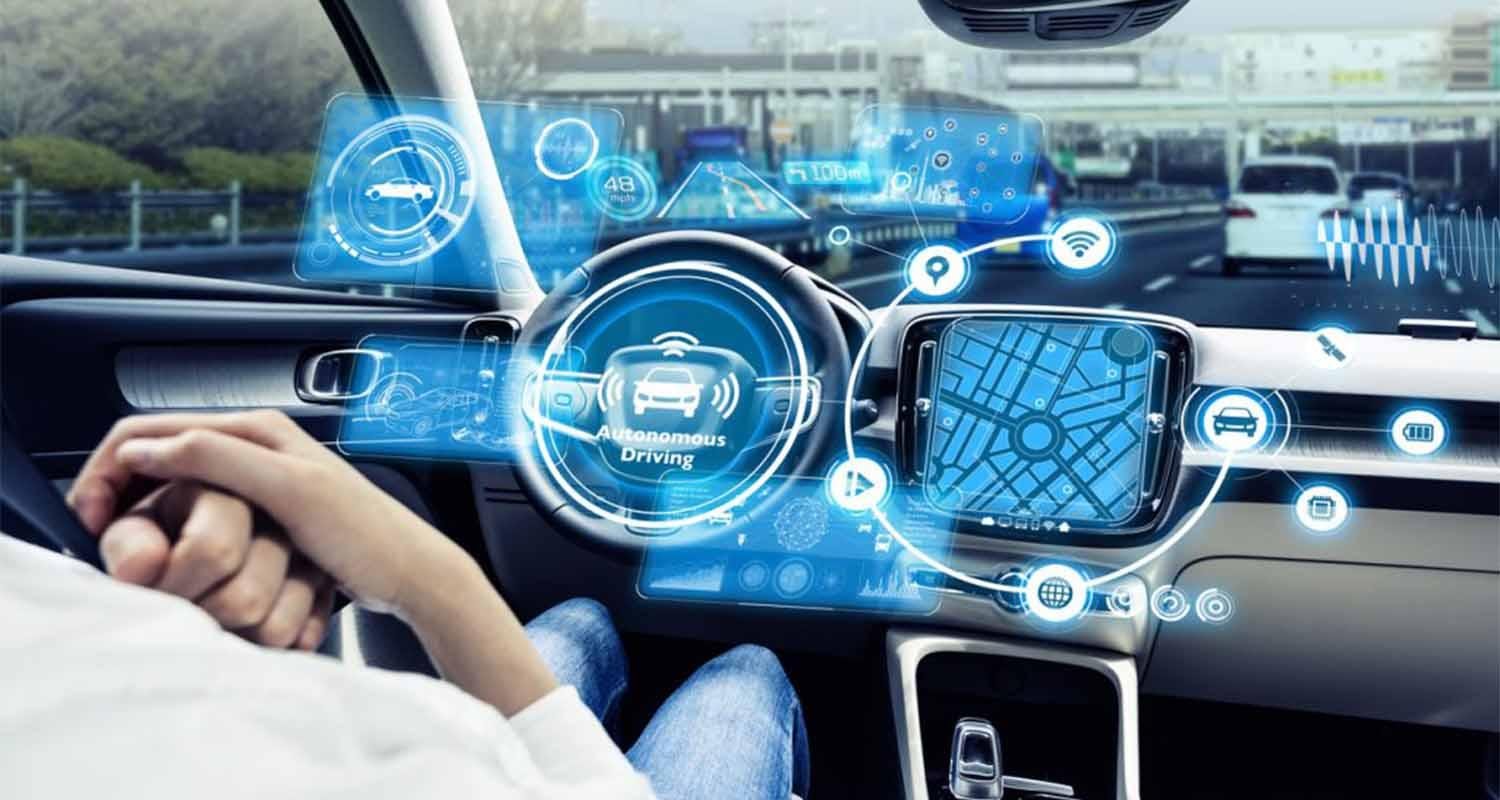
Over the past few years, the transport sector has witnessed the inception of an electric car revolution.
Driven by mounting concerns over air quality, associated health problems, climate change, and the imperative for sustainable solutions, there has been a growing surge in demand for electric vehicles.
In this blog post, we will discuss where the electric vehicle (EV) market is today, how far it has come, and where it is going.
However, you don't need to wait for the future to become a member of the green revolution! Have a look at The Electric Car Scheme to learn more about how your business can implement an EV salary sacrifice scheme.
Compare home chargers to find the right one for you
Our handy comparison tool stacks your favourite home chargers side-by-side to help you find the perfect one for you. Try it below!
What is the current landscape of the electric car industry like?
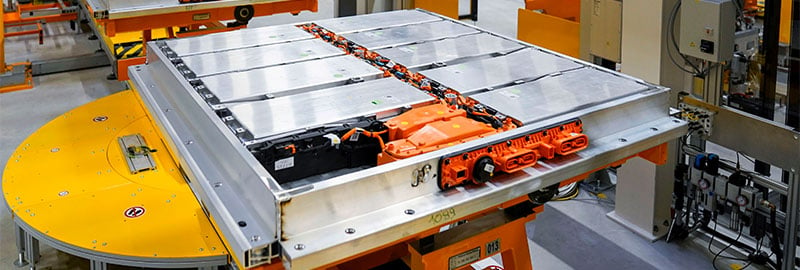
Since 2020, the electric vehicle (EV) market has been steadily gaining popularity.
As of October 2023, there are now 920,000 fully electric cars currently being driven in the UK.
This represents a 40% increase in the usage of electric cars, compared to 2022!
Today, consumers have more fuel options to choose from than traditional petrol or diesel cars, including Plug-in Hybrid Electric Vehicles (PHEVs), Hybrid Electric Vehicles (HEVs), Mild Hybrid Electric Vehicles (MHEVs), and Battery Electric Vehicles (BEVs).
According to data from the Society of Motor Manufacturers and Traders (SMMT), fully electric cars ranked as the second most popular fuel type in 2023 with a market share of 15.4%, with petrol vehicles retaining the top spot.
However, electric vehicles clearly still have room for growth.
In 2016, electric cars constituted a mere 0.4% of all new vehicle registrations in the UK. As of October 2023 this figure has surged to 15.6%, and it is expected to continue rising in the years ahead, contributing to the UK's goal of achieving net-zero emissions by 2050.
The increasing popularity of electric cars can be attributed to advancements in technology - most manufacturers are incorporating cutting-edge features into their EVs while maintaining the familiar comforts found in traditional petrol or diesel vehicles, which means that now more than ever is the best time to consider switching to an electric car
Let's take a look at some of the latest advancements in the electric car industry
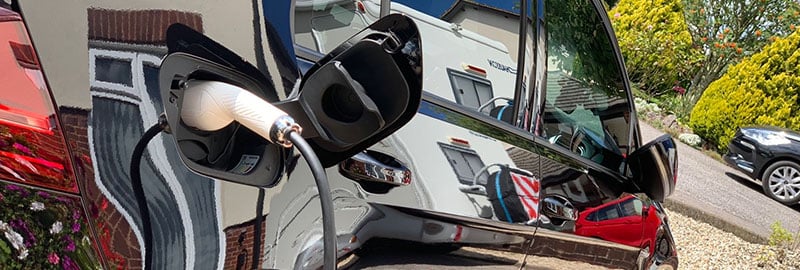
Battery technology has made significant strides in recent years.
Gone are the times when electric cars were limited to a maximum range of just 100 miles, eliminating the once-dreaded 'range anxiety.'
Nowadays, the average EV boasts an approximate range of 212 miles before requiring a recharge, which is quite respectable.
Yet, who wouldn't desire even more mileage? Increasing a car's range typically involves a larger battery, but no one wants to carry around a massive battery pack.
Thankfully, scientists and researchers are actively addressing this challenge - with some new cars such as the Fisker Ocean able to travel 400+ miles - which means you could drive from London to Edinburgh on a single charge.
Researchers are delving into the various factors that influence an electric vehicle's range and developing innovative strategies to extend it.
It's akin to a game of 'range-extending Tetris,' where the aim is to enhance range without resorting to a battery the size of a small elephant.
In the near future, you'll be cruising down the road, leaving range anxiety far behind.
Electric vehicles of tomorrow will have greater endurance, and you won't have to strain to gain those extra miles.
Exciting times lie ahead for electric car enthusiasts!
Last but certainly not least, another groundbreaking battery technology creating a buzz is Solid State Batteries also known as SSD batteries.
These advanced energy storage devices replace the liquid electrolyte found in traditional batteries with a solid material, hence the name.
This design offers enhanced safety, increased energy density, and faster charging capabilities, making it a highly promising technology for the future of electric vehicles.
SSD batteries help eliminate the risks associated with liquid electrolytes, such as leakage and thermal runaway, making them safer to use and reducing the likelihood of battery fires.
Watch this space as it develops over the next few years.
Significant developments unveiled for the UK's charging infrastructure
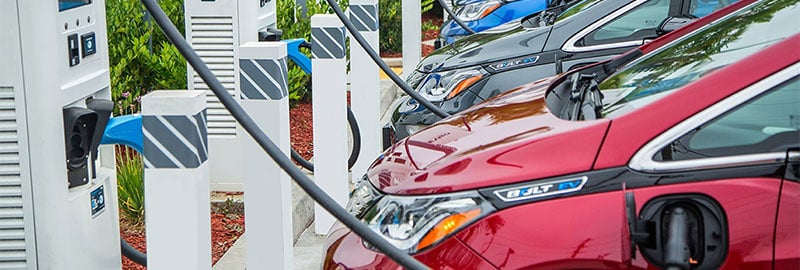
While range anxiety, though less prevalent than in the past due to the advancements in battery technology, still lingers regarding public charging stations, there's reassuring news for electric vehicle owners.
Presently, there are 24,000 charging locations scattered across the UK, and this number is rapidly expanding due to heightened demand and the growth of the electric car market.
The charging infrastructure has significantly improved in recent years, with additional funding allocated to regions with insufficient charging point installations.
As reported by Zapmap, a remarkable 1,634 new chargers were introduced in the previous month alone, pushing the total count of charge points to 51,516 as of the end of October 2023.
This signifies a 45% increase compared to the preceding year.
In February 2023, the Department of Transport unveiled a £56 million allocation aimed at enhancing charging infrastructure in areas where improved networks are needed.
This development is a promising indicator of the continual enhancement of electric vehicle infrastructure.
As the UK's charging infrastructure across the country grows, gone will be the days of EV drivers having to wait at long public charge point queues to re-charge their cars.
Innovation has transformed electric vehicles from mere modes of transport into immersive experiences
The evolving technology in electric car features is no secret, as electric car manufacturers compete to outdo one another.
Electric cars are a relatively new phenomenon, leading to questions about brand loyalty; even die-hard BMW enthusiasts might explore options like Tesla or Polestar for their next vehicle.
The key takeaway here is that the competition has intensified, and there is a greater emphasis on differentiation, given the multitude of choices available beyond traditional upgrades.
Let's have a look at some of the futuristic features car companies are including with their EV's!
BMW iX intelligence panel
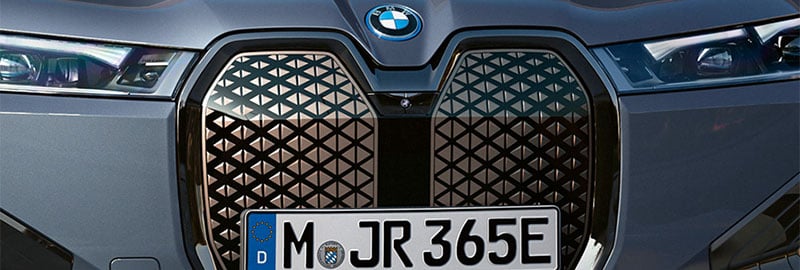
Among the more subtle innovations is the BMW iX intelligence panel, a reinterpretation of the traditional grille found on BMW's petrol and diesel vehicles.
Despite the absence of any real necessity, BMW retained the grille on their electric cars.
While the grilles on their petrol and diesel counterparts were originally designed to vent the internal combustion engine, the electric iX, powered by a battery, gave this feature a new purpose – transforming it into an intelligence panel.
This intelligence panel grille on the electric BMW houses an array of sensors designed to enhance the driving experience.
Moreover, it boasts a self-healing capability, which can mend any scratches in a warm environment, ensuring that the car maintains its shiny and pristine appearance – just as BMW enthusiasts prefer.
Audi virtual exterior mirrors
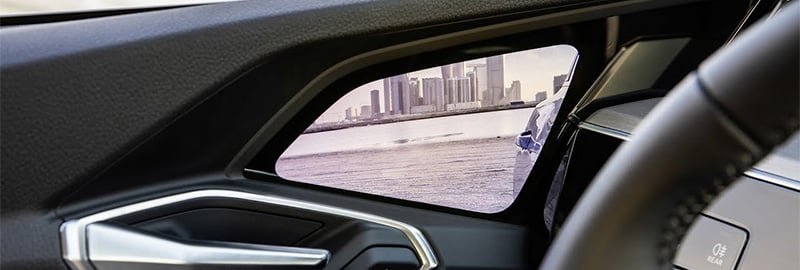
The Audi Q8 e-tron introduces a novel feature that is becoming increasingly common in other electric vehicles: virtual mirrors.
Positioned on each side of the car precisely where conventional mirrors would typically be located, these cameras serve a specific purpose.
Their aim is to offer a more comprehensive perspective of the driver's surroundings and enhance the driver's awareness of their environment.
Hyundai e-Corner system
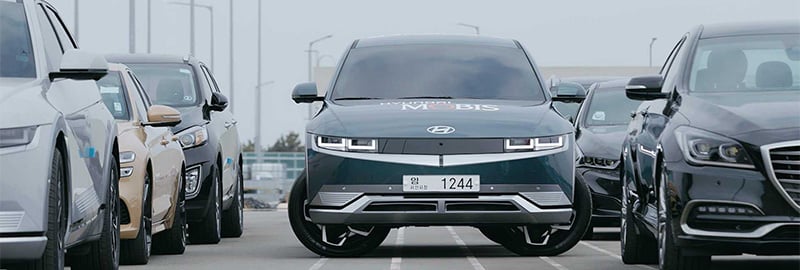
When it comes to electric vehicles, there's already an impressive array of state-of-the-art technologies, and more innovations are on the horizon.
One groundbreaking advancement that is reshaping EV manoeuvrability is the Hyundai e-corner System, with particular attention to its 'Crab Mode.'
The Crab Mode, an integral component of the e-corner System, introduces an entirely new level of convenience when it comes to parking in congested or tight spaces.
Picture effortlessly gliding into parallel parking spaces and effortlessly navigating out of once-dreaded tight spots.
As electric vehicles continue to advance, technologies like the e-corner System and its Crab Mode feature unquestionably demonstrate an ongoing commitment to delivering ever-evolving and innovative solutions that enrich the overall driving experience.
Hyundai Prophecy
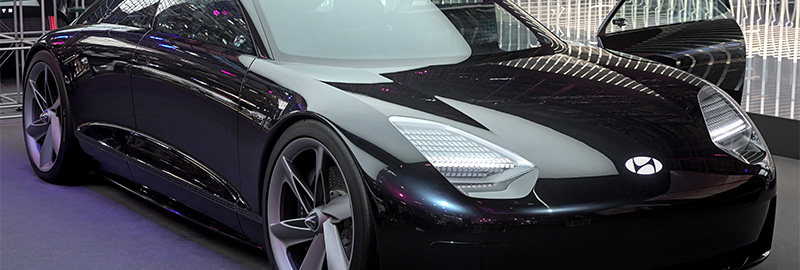
Another great futuristic offering Hyundai is set to unveil in 2025, is their brand new EV - The Prophecy.
Hyundai is solidifying its position as a prominent electric car manufacturer, thanks to models such as the Ioniq and Kona.
However, the Prophecy, introduced as a high-end concept car, represents a significant departure.
Here are some of the unique features that will truly propel the EV market into the future:
The exterior of the vehicle features 'pixelated' lights, creating a distinctive and unique headlight design unlike anything else seen on the road.
The 'skateboard'-based drivetrain design situates the batteries and motors low, providing more space within the cabin.
In a departure from convention, the Prophecy forgoes a traditional steering wheel, instead relying on two joysticks for control.
The dashboard of the Prophecy doesn't feature the standard array of dials and switches; rather, it incorporates a bank of screens for a modern and futuristic interface.
While both the Hyundai e-corner system and Prophecy are yet to be introduced to the market both the Audi Q8 e-tron, and the BMW iX are available to salary sacrifice with The Electric Car Scheme.
The table below highlights the cost savings you can enjoy when signing up to our scheme.
Have a look at our quote tool to browse more cars.
Audi Q8 e-tron Sportback | BMW iX Estate | |
The Electric Car Schemes Prices | £765 | £622 |
Average cost of Personal lease | £1205 | £961 |
Difference | £440 | £339 |
Cost savings over 3 years | £15,840 (37%) | £12,217 (35%) |
Lease term | 3 years | 3 years |
Mileage | 10,000 miles | 10,000 miles |
The Electric Car Scheme’s pricing is based on data collected from The Electric Car Scheme quote tool. All final pricing is inclusive of VAT. All prices above are based on the following lease terms; 10,000 miles pa, 36 months, and a £70,000 annual salary, and are inclusive of Maintenance and Breakdown Cover. The Electric Car Scheme’s terms and conditions apply. All deals are subject to credit approval and availability. All deals are subject to excess mileage and damage charges. Prices are calculated based on the following tax saving assumptions; England & Wales, 40% tax rate. The above prices were calculated using a flat payment profile. The Electric Car Scheme Limited provides services for the administration of your salary sacrifice employee benefits. The Electric Car Scheme Holdings Limited is a member of the BVRLA (10608), is authorised and regulated by the FCA under FRN 968270, is an Appointed Representative of Marshall Management Services Ltd under FRN 667174, and is a credit broker and not a lender or insurance provider.
Want to know more about salary sacrifice?
We have a helpful guide that should answer all your questions surrounding salary sacrifice
With The Electric Car Scheme, you can accelerate your journey into the future through the power of salary sacrifice
Our employee benefit scheme enables employers to lease electric cars on behalf of their employees. In return, employees commit to covering the lease costs using their gross income.
Since this vehicle serves for personal use, HMRC categorises it as a 'perk,' requiring the payment of Benefit in Kind (BIK) tax. Currently, the BIK tax rate stands at only 2% until 2025.
To learn more about how electric car salary sacrifice can help you achieve savings of 30-60% on any electric vehicle visit our website, and schedule a conversation with one of our experts.


